The Decriminalization of Mental Illness In Dane County
By Bobbie Jo Disch, NAMI Dane County Intern
On Monday, September 27th, Joe Parisi, Dane County Executive, announced $10 million dollars in funding to construct the Dane County Crisis Triage Center (CTC) as part of his 2022 budget. Parisi is also creating a new division within the county government called the Division of Behavioral Health to oversee these new changes. The CTC will follow the creation of the Community Alternative Response for Emergency Services (CARES) team, and both will work together to decriminalize mental health and deter the involvement of the criminal justice system for individuals who are having a mental health crisis.
The Crisis Triage Center and CARES team are part of a 14-part reform package that was announced by Sheila Stubbs and Analiese Eicher in June of 2020. Analiese Eicher, Dane County Board Supervisor, who helped create and announce this reform package described the packages being “a result of years of data driven recommendations put into action”, while Dane County Sheriff Barrett describes the reform package as “rethinking” the criminal justice system and “not doing things just because that was how we had done them in the past.” Eicher cited the Black Lives Matter movement and the COVID-19 pandemic for sparking increased interest in change from the Dane County community. She described the community as always caring about issues of change; however after seeing the basic needs of their neighbors becoming threatened, many community members saw change in our community as increasingly more important. Overall the hope for this reform package is that it will result in a healthier community where individuals struggling with mental and behavioral health issues can find health care instead of finding themselves involved with the criminal justice system.
The Dane County Crisis Triage Center will be a comprehensive facility that will allow individuals to receive help by obtaining a referral from other partners, being brought in directly by law enforcement or by walking in themselves. Sarah Henrickson, Clinical Team Manager and first embedded crisis worker, describes this model as having “no wrong doors”. The CTC will be filling a large gap in mental health care as it will allow for a place to go other than an emergency room for an individual in crisis. Often, an individual in crisis will be aware that they are in need of immediate help, however, other behavioral health interventions can take days or even weeks to actually receive help. On the other hand, the emergency room can seem inappropriate and intimidating. The CTC will fill this gap by creating high quality, emergency care curated exclusively for mental and behavioral health emergencies. The CTC will be crucial for keeping individuals struggling with behavioral health issues out of the criminal justice system. Henrickson describes the threshold for arrest to be low while the threshold for emergency detention and treatment is high. This means that it is easier for law enforcement to arrest an individual in crisis who is not necessarily dangerous, but is creating issues in the community, than it is to get them mental and behavioral health support. There are many barriers for emergency detention, so the Crisis Triage Center will allow for an in-between. Law enforcement will be able to drop off an individual for a 23-hour visit. There, staff will monitor and treat the individual until they have a plan for what to do next. The CTC can then move the individual to a more appropriate location or refer them to other resources that they can choose to take advantage of. The overall aim of the CTC is to get an individual through the window of crisis safely.
The Community Alternative Response for Emergency Services, or CARES team, is a new program that launched in the summer of 2021 that aims to destigmatize mental health problems by sending crisis workers to mental health emergencies. When 911 receives a call regarding a behavioral health incident, the dispatcher can choose to send the CARES team which consists of an embedded crisis worker and a paramedic. According to Henrickson, sending armed officers to scenes of mental health emergencies continues to stigmatize mental health. She explains that it amplifies the perception that individuals struggling with mental illness are dangerous to the community. Additionally, she explained when police officers are called to the scene of an incident they are immediately in “emergency mode”. Police officers are trained to deal with mental health emergencies, however, as an individual becomes more agitated, this contact with the police could turn into an arrest. This is why the CARES team crisis worker would be important to keeping individuals out of the criminal justice system.

